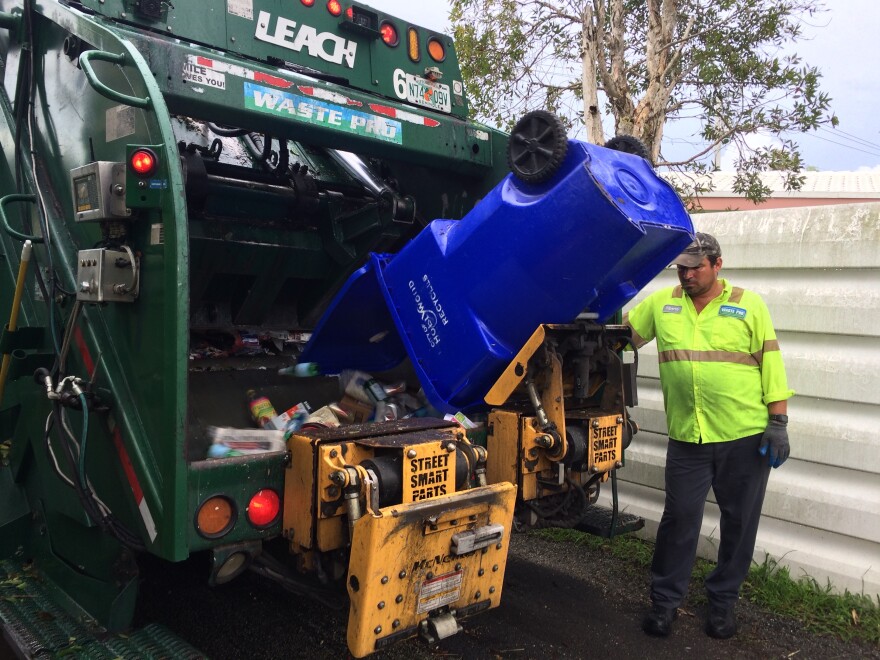About half of the junk Floridians left out on the curb in 2013 went into landfills, the other half was either incinerated or recycled. But the state would like to see less trash headed to dumps—just 25 percent—by 2020. So counties and cities have been trying to figure out how to get people to recycle more and trash less.
One of those experiments has been playing out in Hollywood for the past five years, and it has turned recycling into a game.

Donna Greene is a Florida native, and recycling at her home in the Broward County city works pretty much like normal. She throws tin cans, newspapers and plastic bottles into a giant 64-gallon recycling bin, then rolls the junk to the curb.
Eventually a big truck pulls up, grabs the bin with a mechanical lift, dumps it and drives away with the recycling.
But on the front of the blue bins is a small circular chip. As that lift picks up the bin, it simultaneously weighs the contents and scans the chip. The more weight, the more points your house gets. And you can use those points for things like magazine subscriptions, movie tickets or Bed Bath & Beyond coupons.
Donna Greene remembers when the city introduced the program, called Recyclebank, in 2010.
“It was hilarious because everyone at the diner where we eat in Hollywood was talking about how they were worried their neighbors were going to steal their recycling to get more weight in their bins,” said Greene.
“We found bowling balls, for example, in the bottom of recycling bins,” said Paul Winn, executive vice president and general manager of Recyclebank. (He points out that the company is wise to these kinds of things, so don’t try them.)
The point of the program is to make the benefits of recycling less abstract, said Winn.

“We know recycling is a good thing for the planet, but it’s hard to really understand ‘if I put my can in the recycling bin, what does it mean for me?’ And so we try to use rewards as a way to help incent and promote that activity.”
Recyclebank is now in about 350 communities and Winn says they’ve seen recycling rates increase in all of those communities including Hollywood.
“In the state of Florida overall it’s going up,” said Nurcin Celik, an assistant professor at the University of Miami who researches solid waste management.

She says a lot of the increase has to do with renewed attention on the issue since the state set a 2020 goal of 75% recycling throughout the state. That goal came with more money to implement things like single-stream recycling, which means households don’t have to sort their recycling.
“The counties might be in a little bit of a rush to hit that goal,” said Celik. “Even if they can’t hit that goal, I’m sure they’re trying to show some trend that they’re increasing.”
So the increase isn’t just happening in places like Hollywood that have Recyclebank.
In fact, in some places where the program was rolled out, the rewards didn’t work as well as anticipated.
Among those is Ann Arbor, Michigan. The city tried Recyclebank for two years, but quit the program early, electively paying a fee for breaking the contract.
Bryan Weinert, policy advisor for Recycle Ann Arbor which handles the city’s recycling services, said some residents were actually offended by needing an incentive to do something they were already doing.
“[Residents were] like, “Look we've been doing this for decades. Don’t kind of patronize me. I’m not a kid that needs to be offered a piece of candy to do the right thing.’”

And while Donna Greene in Hollywood isn’t offended, she says the points or rewards aren’t the reason she recycles, “but it’s a nice bonus knowing that it;s actually going to give me something tangible not just in the big picture but like going to a movie with a free ticket.”
Greene’s family gets around 150 points a week. After about seven weeks worth of tin cans, newspapers and coke bottles Greene recently cashed in her point for a free movie ticket.
“I actually saw American Ultra. It was awesome, not for everyone though.”
Like this recycling program; it may not have been for Ann Arbor, but Hollywood officials don’t have plans to quit anytime soon.



